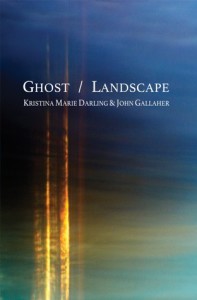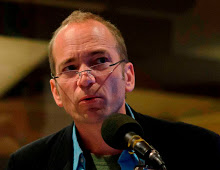 Book Title, Press, Year of Publication:
Book Title, Press, Year of Publication:
Ghost/Landscape, BlazeVOX, 2016
Synopsis: Two poets writing a prose-poetry travelogue of the psychic American West. As it turned out, only one of us liked traveling.
What do you think makes your book (or any book) a “project book”?
This book is a project, specifically because two people wrote it together, so there was always an added structural element of talking back and forth. We started out with the idea of landscape as a source of unity within the manuscript, but we mostly discovered the project as we worked. For example, neither of us expected the bank robbery to happen so early in the collaboration, and if or when we’d ever get to Chapter One.
Why this subject (or constraint)?
We were both between things and had a little time on our hands. So one of us would write a prose poem, then a prose poem in response would arrive through the internet ether. This structure allowed us each a certain degree of autonomy within the collaboration, and created tension between two very different voices and aesthetics, complicated and aided by the fact that we didn’t tag who wrote what.
Are you comfortable with the term “project book”?
Good question. My short answer is “no.” But to tell you the truth it doesn’t really bother me all that much either. I’d just choose not to say that. “Project book” to me sounds planned out, and I’m not much of a planner. Also, many poets would want to speak more specifically about their work than what is possible with the very general term “project.” For example, some projects are archival, some are grounded by narrative, and others find their structure through form. The term project isn’t objectionable, but in my opinion, there are other, more descriptive ways of speaking about book-length sequences.
Was your project defined before you started writing? To what degree did it develop organically as you added poems?
Only the fact that it would be written in prose. That’s one of the great things about collaboration. You don’t know where you will arrive, no matter how much (or how little) you plan the work, its structure, and its constraints. Writing with someone whose style is slightly different often pushes you in new directions, whether it’s through your use of form, narrative, or persona. This freedom is also a responsibility: we were writing as ourselves, but also as the other. It was a lot of fun, really.
Did you allow yourself to break your own rules?
Not the rule about writing in prose, but any other rule either of us thought up was open territory.
How important was it for you that each poem could “stand on its own” or that the poems should rely on other poems in the book, or on the premise of the project itself, to succeed? What challenges did this present for you when writing single poems or structuring the book overall?
Not very important. But not unimportant either. We liked the idea that one could flip open the book at any spot and start there. “Enter anywhere” isn’t quite the same as “stand on its own” but close enough as a working philosophy. Since both of us have worked on book-length sequences in the past, this was one of the ways that collaboration challenged and pushed against our aesthetic choices as individual writers. And then we both bring back to our future work the experience of having done this book. That’s especially nice.
At any point did you feel you were including (or were tempted to include) weaker poems in service of the project’s overall needs? This is a risk, and a common critique, of many project books. How did you deal with this?
No, not really. The back and forth kept things really fresh, and the episodic nature of the book kept us on our toes. Collaboration within a given structure is often more spontaneous than books that are written on the level of the individual poem. But spontaneity is a strength, not a weakness, though we did go back and look at it when it was complete and reordered things here and there, as well as some revision.
Did you fully immerse yourself in writing this project book, or did you allow yourself to work on other things?
It all went pretty quickly, so most of our energy was here with this book, but other things are always going on as well in some form. For example, both of us were traveling at the time the book was written, though in very different locales (Paris vs. Wyoming, to be precise). Because the writing process was immersive, almost everything ended up in the book.
Did you ever lose momentum, bore yourself, or worry that your project could not be sustained for a full-length book? How did you push through?
That never came up. We hope it doesn’t for the reader either!
As you were writing, were you influenced by your experience or perception of how project books are received by readers and editors (either positively or negatively)?
Confession: We wrote our collaboration on Facebook. So we were mostly worried about the guilt. I mean, if one of us signed into Facebook, posted a status, and hadn’t done a poem yet, there was a guilt factor. Which is to say, there was definitely some degree of accountability as a result of the format. Not that we were spying on each other or anything. But not that we weren’t, either. Just saying.
Do you have a sense of whether the fact that this is a project book helped position it to find publication more easily? Has it helped you find readers?
I don’t think it’s mattered much one way or the other, though I’ve not heard directly about this angle from anyone. Who knows, then, maybe it has!
As a reader, are you drawn to project books? What project books have influenced you or have you enjoyed, and what do you think makes those books successful?
I’m drawn to books for innumerable reasons! Tom Phillips’s The Humument is a favorite. Cole Swensen’s work as well, especially Gravesend. And of course, Janet Holmes’ The ms of m y kin, Yedda Morris’s Darkness, Laurie Sheck’s Captivity, and Karen Volkman’s Nomina.
What advice can you offer other writers, particularly emerging writers or poetry students who may be using the project book as a guiding principle for their own work?
Don’t limit yourself from the beginning. Allow the project to change shape as you write. I say this because one of the criticisms I hear of project books is that they feel forced. With that in mind, it’s important to allow for some degree of spontaneity even when working within a preconceived structure. There’s always plenty of time after you’ve been writing to start placing limits on what you’re doing or have done.



